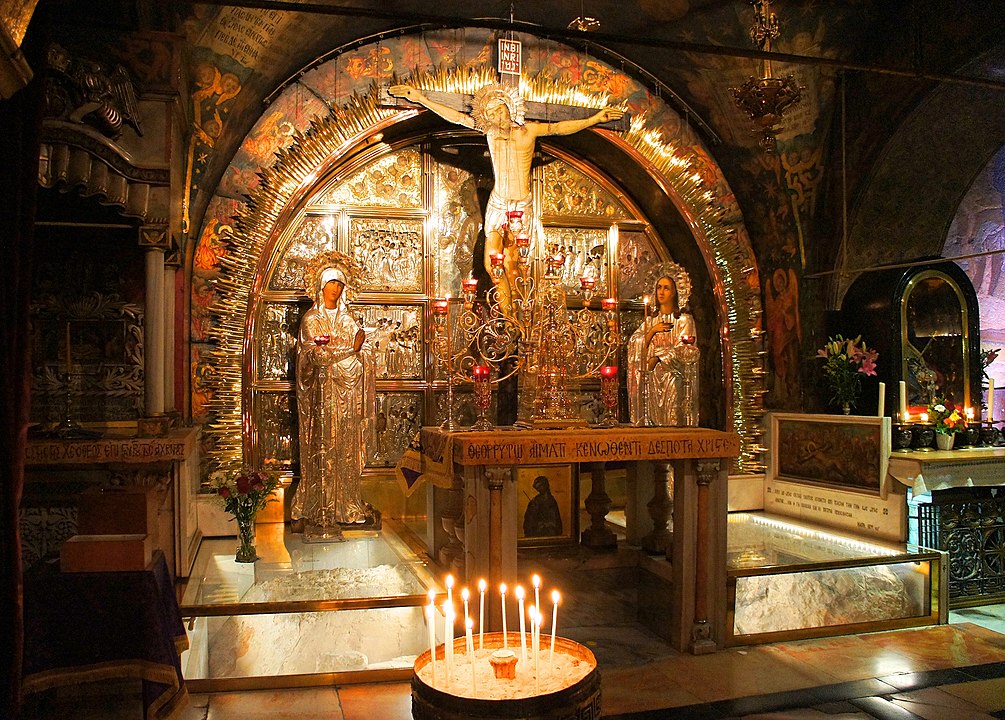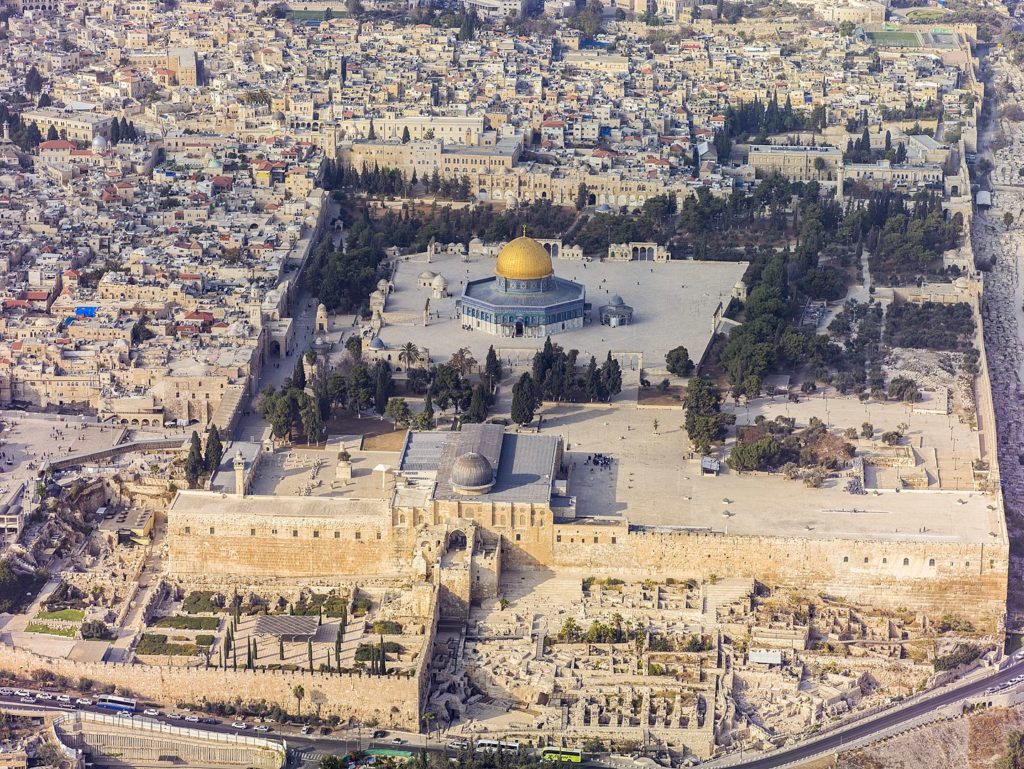Last year, Polymath launched a densely-researched, on-location podcast about the history of Jerusalem. We sat down with the show’s host, Dr. Tim Dalrymple—founder of Polymath and current president of Christianity Today—to learn how it all went down.
Tim, thanks for taking time to chat about your experience on the podcast. I know this project was made possible by our partner The Philos Project, who I assume had their own ideas. But, what led to this particular topic for the podcast?
Polymath has done extensive work in Israel with the Museum of the Bible and with Bible Journey, and in the process of serving those two clients, we developed a rich network of relationships within Israel. I was part of multiple trips to Israel, and in each of those trips, my favorite part was always when we found our way into the old city of Jerusalem. I remember the first trip…I felt like I had been transported back in time to this other world that had this magic and mystery. So, we went and walked around the old city at night and I fell in love with the place.
When we began to develop a relationship with the Philos Project, we had a set of meetings up at their offices in New York City. They were interested in developing a content ecosystem that could educate American audiences about Israel and its relationships within that Middle Eastern context and the Hebraic origins of the Christian faith. We were brainstorming possibilities and began to discuss the idea of doing a podcast on Jerusalem, [which could be heard by a] lot of people who could then learn about other offerings from the Philos Project.
Was there anything new you learned about Jerusalem from working on the podcast?
This project afforded some opportunities to go into places that one would not otherwise be able to visit. So, even though I had been to Jerusalem on multiple occasions previously, I had never been able to go inside the Dome of the Rock or into the Well of Souls underneath the Foundation Stone inside the dome, and had never stayed overnight in the Church of the Holy Sepulchre and gone down into the Chapel of St. Vartan. So, it was a great opportunity to build relationships with people locally and also to gain entrance to some places that tourists don’t normally see.
The great thing about Jerusalem is that there’s no shortage of deeply fascinating stories to tell.
(At this point, Tim told the exciting story of staying overnight in the Church of the Holy Sepulchre, where, through a few tunnels and a door that typically remains locked, he encounters one of the earliest works of Christian art. But, we won’t spoil it—go listen to Episode 5.)
I was able to see that Jerusalem is such a many-layered entity. The deeper you plunge into the cracks and fissures of the place, the further you go down into these layers of history, and it seems virtually bottomless.
Some of those moments from the podcast are just incredible, but I understand that not everyone was hospitable, and that there were some real frustrating moments. Can you tell us about the challenges of doing production in Jerusalem?
People come from all over the world to these places…as tourists, and they don’t express enough respect or reverence for those who are there to worship. There’s a lot of sensitivity in the relationships between Jews Christians and Muslims (and sects within each), so, you’re always at risk of running afoul of any of those sensitivities. It’s a difficult place to do production work—whether that’s video or audio—because of all of those sensitivities and having to navigate the labyrinth of different organizations that control different parts of the city.
For instance, the Franciscans (part of the Custodia Terrae Sanctae or “Custody of the Holy Land”) are more rigid—there’s more process to go through in order to get rights to bring in cameras and so forth into any churches or spaces within churches that they control. When we were laying the groundwork for the production, we didn’t quite understand that. [When] our producer Dale whipped out his camera, very quickly we had people descend upon us from the Custodia Terrae Sanctae, who insisted he had to leave. When I came to his defense and argued that he should be able to stay, I was asked to leave, as well.

In the world of podcasting, there are many formats one could use. Some are more conversational, others more scripted. There’s journalism, analysis, or narrative… Can you take us through the questions and factors you wrestled with to determine which approach to take?
We discussed a number of different options—some of them might’ve been interesting in the abstract but didn’t serve the concrete purposes of the client. It was important that whatever we produced would serve an educational purpose.
The Philos Project had spun off a separate entity called Passages that takes thousands of people to Israel every year, almost like a Christian version of a Jewish heritage trip. Philos also brings any number of VIPs to Israel in order to educate them about Israel and its broader place in the Middle East. They wanted something that could serve to whet the appetite for people who were about to go, and also to further engage and educate people who had already gone and were already in their network. The great thing about Jerusalem is that there’s no shortage of deeply fascinating stories to tell. So, it wasn’t necessary to have an outside-the-box creative structure; simply doing an excellent job of storytelling when you have what I believe is the world’s most fascinating city—that alone would be enough to grab people’s interest.
Those of us in the creative industry know how quickly the direction of a project can evolve, especially one as large as this. Were there any findings, challenges, or opportunities along the way that shaped what the podcast became in an unexpected way?
One of the challenges is that when you start to talk about monks and priests around the Church of the Holy Sepulchre, or the Muslim scholars, sheiks, and imams around the Jerusalem Waqf—who are responsible for the Al-Aqsa Mosque and what we would call the Temple Mount—or when you’re talking about scholars of the various universities and museums within the city…much of the communication has to happen in person. There’s so much demand for their time. They’re not on email 24/7 like we are. It was a challenge for our production team that we couldn’t line up a bunch of meetings in advance, and instead, we had to arrive and build relationships, take advantage of opportunities when they presented themselves, and be agile.
It’s also a tricky city to navigate. When you’re talking about doing production in a city that’s 5,000 years old, carrying equipment across narrow stone walkways, and dealing with the vagaries of where you’re allowed to go, you have to be light on your feet. There’s a particular skill that we had to acquire in navigating tricky environments and nonetheless pulling off an excellent production.

It sounds like you were forced into a situation where, instead of really starting with a precise narrative, you just had to gather up as much great info as you could, then assemble in post-production the story that was worth telling. Can you walk us through that production process?
We started by outlining episode guides. We knew that our concepts could evolve, but scoped out what we thought would be eight outstanding episodes… We had a sense of the story we wanted to tell and the kinds of scholars we would like to talk to. To make this useful for people who are actually going there, we also wanted to relate the stories to particular locations in the city.
People like to say content is king, but when it comes to the vast ocean of content we all swim in, I think quality is king.
One of our biggest surprises was “The Jesus Guy.” This is a gentleman who felt called earlier in his life to abandon all the trappings of materialism and live a very simple life in the imitation of Christ, with nothing but a blanket, a robe, and a Bible. We were aware of the phenomenon of “Jerusalem syndrome,” where people go there and suffer some sort of mental break. The locals told us that he hangs around every day and is an English-speaking American. So, I approached The Jesus Guy and asked if I could interview him for the podcast. When I really got into conversation with him, I felt kind of embarrassed that I had approached this thinking [he] is someone who has probably lost his mind. [Actually,] he was perfectly sane; he knew he was not Jesus. I came to realize that what drew him there was the same thing that draws a lot of people: a search for meaning and purpose and following your sense of where God is drawing you. I think he was very courageously and faithfully giving up all the ordinary comforts of life to follow Christ in the way he felt called to do.
(Hear the full story of The Jesus Guy in Episode 8.)
Podcasts have really taken off, especially as brands shifted content strategies to something they could produce at home during the Covid-19 pandemic. What are your thoughts on when a podcast might be a strong addition to one’s content strategy?
Podcasting is an incredibly powerful storytelling medium. For organizations that have stories to tell, I think it is an important medium to consider. Relative to the high cost of video production, podcasting gives you the opportunity to roll out a large number of stories more affordably and test how your audience is going to respond. It’s not as cheap as, say, social media or just writing up a blog post. But, podcasting allows you to tell the story in a much more gripping manner, and it’s particularly valuable when you can make the most of the auditory medium, where the inclusion of music and auditory textures enriches the entire experience.
For those considering doing their own podcast, do you have any suggestions for how to approach it and how to ensure it’s effective?
People like to say content is king, but when it comes to the vast ocean of content we all swim in, I think quality is king. In 2009, the blogosphere was exploding. By the time you get to 2012, it felt like everybody had a blog. It was no longer new or intriguing simply to have a blog; it had to be an excellent blog that offered far more value then you could find on other sites. I think we’re at the same point with podcasting now. Organizations that are thinking about a podcast need to approach it not as though it’s just some organizational imperative but as a real opportunity to provide value for the people they want to reach. It’s worth investing in quality. It’s worth investing in research.
These days there are so many podcasts that are just skipping or zooming with someone and having a conversation. It’s difficult to stand out in that environment unless you’re an exceptionally talented interviewer or you have access to interviewees that other people don’t have access to. If neither of those two things are the case, then you need to think about the value that you can add for your audience and make sure they can see the professionalism and thoughtfulness that went into it.
You can listen to all eight episodes of The Jerusalem Podcast on Apple Podcasts, Spotify, or Stitcher. And be sure to check out the Jaffa Gate portal from the Philos Project for a roundup of today’s news and analysis from the Near East.